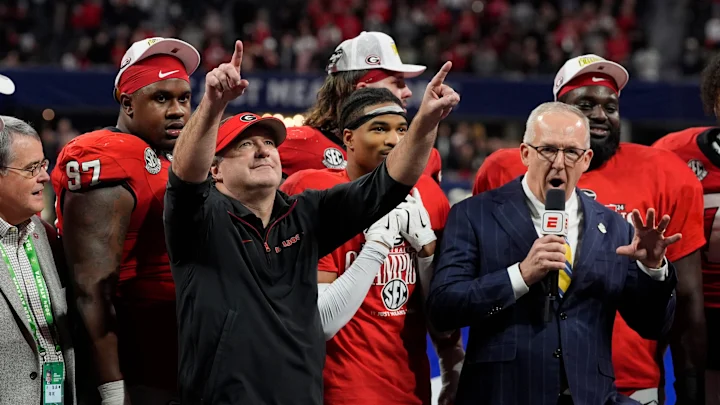Georgia football, ranked No. 3 in ESPN’s Future Power Rankings for 2025, has dropped from No. 1 after holding the top spot for the past two years.

For the past two years, Georgia football has established itself as a powerhouse in college football, reigning supreme not only on the field but also in the eyes of analysts and fans alike. ESPN’s Future Power Rankings, which assess the long-term potential of college football programs based on recruiting, coaching, player development, and overall program infrastructure, placed Georgia firmly at the top. However, ahead of the 2025 season, the Bulldogs have experienced a notable shift, dropping from No. 1 to No. 3 in ESPN’s latest rankings.
This transition prompts a comprehensive examination of what this change signifies, the underlying reasons, and how Georgia can respond to maintain its status as a national contender. In this article, we delve into the factors influencing ESPN’s rankings, the current landscape of college football, Georgia’s evolving program, and the broader implications of this shift.
Understanding ESPN’s Future Power Rankings
ESPN’s Future Power Rankings aim to project the long-term potential of college football programs by evaluating several key components:
- Recruiting Success: The ability to attract top-tier talent nationally.
- Player Development: How effectively the program develops recruits into NFL-caliber players.
- Coaching Stability and Quality: The impact of coaching staff, staff continuity, and strategic leadership.
- Facilities and Infrastructure: Investment in training facilities, stadiums, and support systems.
- Program Stability: Overall organizational health and the ability to sustain success.
- Upcoming Talent Pipeline: The strength of current recruiting classes and future prospects.
By analyzing these factors, ESPN assigns a ranking that reflects a program’s potential to succeed in the coming years, not just immediate on-field results.
Georgia’s Rise to No. 1 and Subsequent Drop
The Rise:
Prior to 2023 and 2024, Georgia football had been ascending rapidly, culminating in back-to-back College Football Playoff national championships in 2022 and 2023. The Bulldogs’ dominance under head coach Kirby Smart, combined with recruiting classes that consistently ranked among the nation’s best, secured their status atop ESPN’s Future Power Rankings.
The Drop to No. 3:
However, in the latest rankings for 2025, Georgia has slipped from No. 1 to No. 3. This shift reflects changes in the program’s projected future strength, influenced by various factors, including recruiting dynamics, roster turnover, coaching landscape, and emerging competitors.
Factors Contributing to Georgia’s Ranking Shift
1. Recruiting Class and Talent Pipeline
While Georgia remains a recruiting powerhouse, the landscape of college football recruiting is highly competitive. Other programs, notably Alabama, Ohio State, and Texas, are ramping up their efforts, possibly closing the gap in talent acquisition.
- Recruiting Class Quality:
ESPN’s rankings evaluate the overall quality and depth of incoming classes. If Georgia’s recruiting classes for 2024 and 2025 are slightly less elite compared to previous years, it could impact future roster strength. - Regional Competition:
The Southeastern Conference (SEC) remains highly competitive, with several programs investing heavily to elevate their recruiting efforts. This competition may influence Georgia’s ability to maintain its recruiting dominance in the coming years.
2. Player Development and NFL Pipeline
Georgia’s reputation for developing NFL-ready players is a cornerstone of its success. However, the program’s ability to sustain this pipeline depends on coaching staff, player attrition, and the emergence of new talents.
- Roster Turnover:
After consecutive championships, Georgia has seen many top players depart for the NFL. Maintaining a pipeline of high-caliber talent requires continual recruitment and development. - Coaching Staff Dynamics:
Changes or shifts in coaching staff, especially in key areas like offensive and defensive coordinators, can influence player development and future prospects.
3. Coaching and Stability
Kirby Smart’s leadership has been instrumental in Georgia’s success. Yet, coaching stability and future planning are factors that influence ESPN’s rankings.
- Coaching Staff Continuity:
Any potential staff changes or departures of key assistants could impact the program’s trajectory. - Strategic Vision:
How well the coaching staff adapts to evolving college football trends—such as offensive schemes and athlete specialization—plays a critical role.
4. Facilities and Infrastructure
Georgia continues to invest heavily in stadiums and training facilities, but competitors are also ramping up their investments.
- Upgrades and Future Projects:
If other programs announce new facilities or enhancements, Georgia’s relative standing could be affected.
5. Emerging Competitors and Changing Landscape
College football is cyclical, with programs rising and falling based on recruiting, coaching hires, and strategic investments.
- Rising Programs:
Schools like Texas, Alabama, and Ohio State are aggressively recruiting and investing, potentially threatening Georgia’s dominance in future rankings. - SEC Power Dynamics:
The SEC’s strength as a conference means Georgia must continually adapt to maintain its edge against formidable rivals.
The Broader Context: College Football’s Evolving Power Structure
The shift from No. 1 to No. 3 is not merely about Georgia’s internal factors but also reflects broader trends in college football:
- Increased Competition:
The landscape is more competitive than ever, with programs investing heavily in coaching, facilities, and recruiting. - Transfer Portal Impact:
The transfer portal has revolutionized roster building, enabling programs to fill gaps quickly but also creating volatility. - NIL (Name, Image, Likeness) Advancements:
NIL deals have become a significant factor in recruiting and player retention, influencing program stability and attractiveness. - Scheduling and Playoff Expansion:
Changes in scheduling strategies and the potential expansion of the College Football Playoff could influence program trajectories.
What Does This Mean for Georgia?
While moving from No. 1 to No. 3 may initially seem like a setback, it’s essential to interpret this within the context of college football’s dynamic environment.
Key implications include:
- Continued Excellence:
Georgia remains a top-tier program with a strong foundation, capable of competing for championships and recruiting top talent. - Need for Adaptation:
To regain or surpass the top spot, Georgia must adapt to emerging trends, continue investing in facilities, and innovate in recruiting and player development. - Motivation for Future Success:
Rankings serve as benchmarks. This shift can motivate the Bulldogs’ staff and players to strive for excellence and reassert their dominance. - Recruiting and Player Development Focus:
Emphasizing elite recruiting classes, player development, and coaching stability will be vital in closing the gap with other top programs.
The Path Forward for Georgia Football
To reclaim the No. 1 spot in ESPN’s Future Power Rankings, Georgia needs to:
- Enhance Recruiting Efforts:
Continue to secure top-ranked recruiting classes and focus on recruiting in key regions and nationally. - Invest in Facilities and Support Staff:
Keep facilities at the cutting edge to attract recruits and retain current players. - Maintain Coaching Stability:
Ensure coaching staff remains cohesive and adaptive to evolving game strategies. - Leverage NIL and Transfer Portal:
Use NIL opportunities effectively and maintain a strong presence in the transfer portal to address roster gaps. - Develop Leaders and NFL-Ready Talent:
Continue to produce NFL-caliber players who elevate the program’s reputation.
The movement from No. 1 to No. 3 in ESPN’s Future Power Rankings is a testament to the competitive and ever-changing landscape of college football. For Georgia football, it’s a reminder that sustained dominance requires constant evolution, strategic investments, and recruiting excellence.
While the Bulldogs have experienced a slight dip in projected future potential, their foundation remains exceptionally strong. With their coaching staff, infrastructure, and talent pipeline, Georgia is well-positioned to challenge for the top spot once again. The ranking shift should serve as motivation rather than a setback, encouraging the program to innovate and adapt in pursuit of continued excellence.
As college football continues to evolve, Georgia’s leadership and players will be tasked with maintaining their status among the sport’s elite, ensuring that the program’s future remains bright and competitive at the highest levels of college football.









